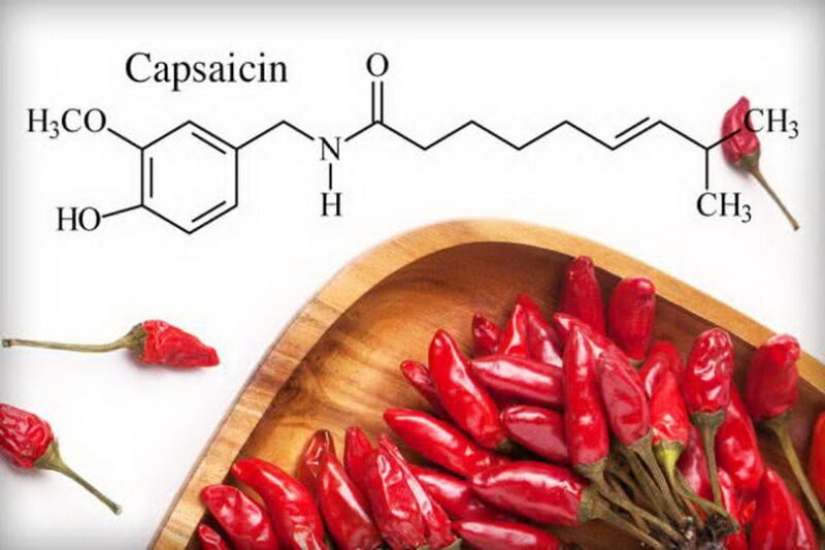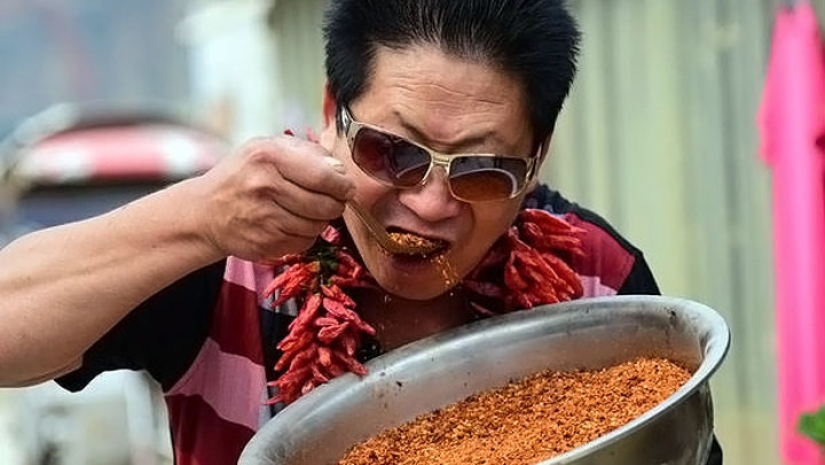Why is it pointless to drink hot water with water and what actually helps
Each of us, having swallowed accidentally or intentionally some too" fiery " dish, tries to extinguish the internal fire with a shock dose of water, preferably cold. But scientists are sure that this method is completely useless in the case of pepper, wasabi or other burning seasonings. Why does water not help and what can actually bring the desired relief?

To understand the question, let's turn to organic chemistry. Hot pepper is given its taste properties by the alkaloid capsaicin, which affects the human TRPV1 receptors. These sensors, given to us by nature, clearly respond to heat and pain when we drink something hot or eat spicy dishes.

The formula of capsaicin, which scientists often call vanillamide 8-methyl-6-nonenoic acid
The receptors signal to the brain that something foreign and dangerous has got into the body and it reacts instantly. If you eat something richly flavored with pepper, then your eyes begin to water, your nose stuffs, there is a burning sensation in the mucous membranes and the same, almost irresistible desire to drink cool water.
This is quite natural, because the body tries to get rid of the irritant by any means. But capsaicin is not neutralized by water and does not dissolve in it – it only becomes more fluid and spreads even more effectively through the oral cavity and esophagus, which only increases the burning sensation. What should I do if I've had too much pepper, can I really tolerate it?

No way! There is a really effective way to deal with the consequences of eating spicy food – the use of dairy products immediately after the appearance of burning sensation. The protein casein, contained in fatty dairy products such as milk, kefir, yogurt, cheese and ice cream, removes capsaicin from the nerve endings, removing burning sensation.
However, not all dairy products are equally useful. Scientists claim that if there is a choice between ordinary cow's milk and kefir with a fat content of 3-4%, then a fermented milk drink will be more useful. Kefir has a stronger effect, since in addition to fats, there are also acids that help to get rid of capsaicin.
Dairy products not only eliminate the cause of burning, but also have a therapeutic effect, enveloping the receptors irritated by spicy food and calming them. In short, if everything is burning inside, you need to run not to the tap, but to the refrigerator with milk or kefir. And what to do in cases when there are no dairy products nearby?
Experts say that milk can be replaced with any fatty food. They recommend drinking a tablespoon of vegetable oil or eating a couple of pieces of chocolate, preferably milk. Strange as it may sound, but, in addition to milk, alcohol can also help, of course, in strictly dosed quantities. A couple of sips of vodka, cognac or wine will significantly weaken the unpleasant sensations.
And again, we will complicate the task by assuming that alcohol is also unavailable. In such very unpleasant situations, you can help yourself with a potato dish. The starch contained in potatoes absorbs capsaicin, almost like activated charcoal. Also, thanks to starch, bread and rice dishes work. Now do you understand why Asians, the most passionate fans of spices, prefer rice?
By the way, it has already been established that the good tolerance of hot pepper is not an innate feature peculiar to representatives of individual peoples. The ability to calmly absorb spicy dishes and even pepper itself comes with training. Mexicans, Indians and Chinese have been hardening their receptors since childhood, so their "fire resistance" is impressive.
Keywords: Milk | Salvation | Drinking water | Food and drinks | Taste | National cuisine
